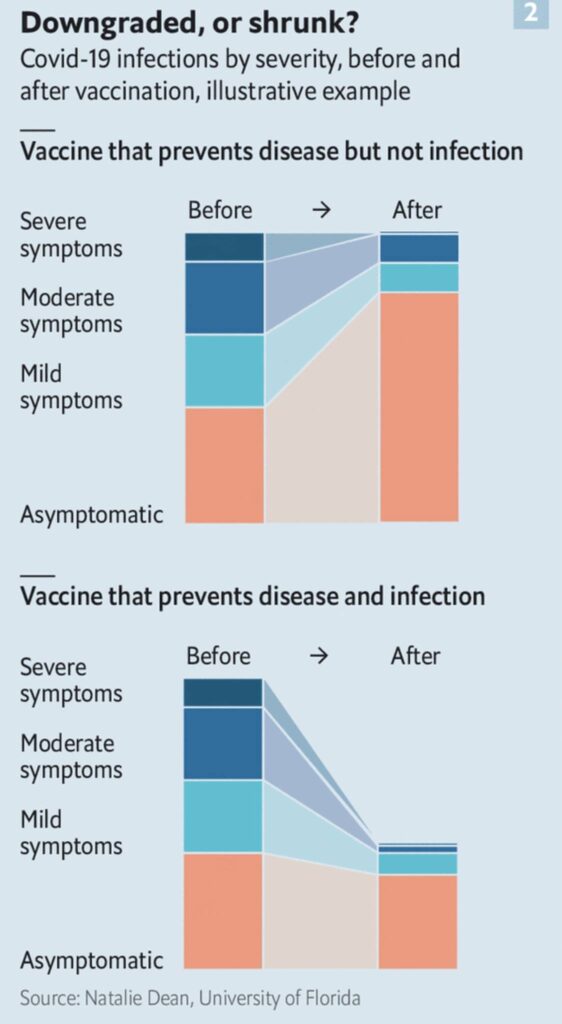A: YES! Evidence continues to mount that the vaccines REDUCE BOTH ASYMPTOMATIC INFECTIONS AND TRANSMISSION.
➡️ While the Nerdy Girls are still dreaming of a world where transmission was explicitly tested in the clinical trials (☎️ call us next time), the data pouring in from around the world strongly suggests that the vaccines are very good (but not perfect) at reducing ALL infections & by extension transmission.
Recall the main question—the clinical trials (largely) tested only participants who developed symptoms. One possible scenario is that vaccines greatly reduce the severity of COVID-19, even to the point of no symptoms, while still allowing the virus to replicate in the nose and throat and potentially be spread to others. This is the top scenario in the attached (and awesome) infographic from Dr. Natalie Dean.
The lower part of the infographic shows a 2nd scenario. Here ALL types of infections are reduced by the vaccine, including asymptomatic. This means much less virus hanging around in any one’s nose or throat ➡️ much less transmission. Scientists have always expected this would be the case based on other vaccines, but quantifying the effect is harder.
To answer this question, we’re most interested in real world studies that also tested for ASYMPTOMATIC ILLNESS, which we now have from several cohorts of Health Care Workers (HCW) in the UK and US.
➡️ The SIREN study included over 23,000 HCWs in the UK tested with PCR tests every two weeks & additional lateral flow tests twice a week (positives confirmed by PCR). The study covers Dec 8, 2020- Feb 5, 2021, a period of surging case rates in the UK. The Pfizer vaccine was primarily used, with only a small % receiving the Astrazeneca vaccine by this time.
The study found:
💥 70% reduction in asymptomatic and symptomatic infection >21 days after 1st shot.
💥 85% reduction in asymptomatic and symptomatic infection >7 days after 2nd shot.
We Nerdy Girls like the design of this study because it started at the very beginning of vaccine roll-out in the UK, and almost all HCWs enrolled eventually got the vaccine during the study (~90%). This reduces our concern that people who chose to get the vaccine might be different from those who don’t in ways that impact their infection risk, the problem that randomized trials are designed to avoid.
➡️ CDC Study
A similar study of 4,000 HCWs in the US came out recently from in the CDC’s Mortality and Morbidity Weekly Report (MMWR). These participants were also tested weekly to pick up BOTH asymptomatic and symptomatic infections. The vaccines used were primarily Pfizer.
They found:
💥 80% reduction in asymptomatic and symptomatic infection >14 days after 1st shot.
💥 90% reduction in asymptomatic and symptomatic infection >14 days after 2nd shot.
This study is smaller than the UK one, and raises some additional concerns about the comparability of vaccinated and unvaccinated groups with lower take-up among HCW in the US. Nonetheless, the low levels of asymptomatic infection among vaccinated workers is striking and very encouraging.
Another study from the US tested around 40,000 people coming in for other procedures at the Mayo Clinic. Again, the advantage here is the ability to pick up *asymptomatic* infections that the person is not aware of.
Results:
💥 79% reduction in asymptomatic infection >10 days after 1st shot.
🙋♀️ What If I’m vaccinated but STILL test positive, am I less infectious?
➡️ Signs point to YES! A study from Israel found that average viral load of those testing positive 12 days or more after 1st vaccination was significantly lower than those within 12 days or those unvaccinated. Lower viral load very *likely* means people are less infectious.
➡️ More evidence on this front comes from a recent large household study in the UK. This study matched new positive cases and their household contacts to vaccination records.
“Index” (those identified first) cases >21 days past ONE dose of the AstraZeneca or Pfizer vaccine were:
💥 40%-50% less likely to pass along the virus to someone else in their household compared to unvaccinated people.
💥 This reduction is ON TOP of the estimated large reductions in the chances of being infected in the first place after one dose of these vaccinations.
BOTTOM LINE…GOOD NEWS!
💥 Vaccines reduce both asymptomatic & symptomatic infection
💥 People without detectable virus unlikely to pass infection to others
💥 Vaccinated people who do test positive less likely to transmit
➡️ VACCINES GREATLY REDUCE TRANSMISSION
➡️ CAVEAT:
This protection is high, but not 100%, so precautions are still warranted in the presence of unvaccinated people, especially those at higher risk of severe disease. Also remember that out in public you don’t always know who is vulnerable or might have lower immune response to vaccines due to immunosuppression. Be a good citizen while we push cases down even lower!
Love,
Those Nerdy Girls
Further reading:
UK household transmission study



